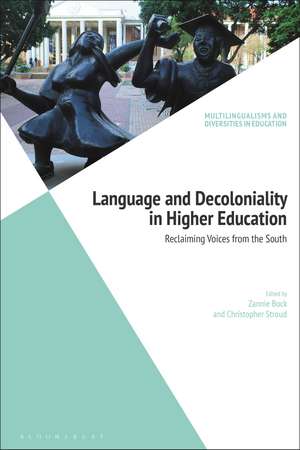Language and Decoloniality in Higher Education: Reclaiming Voices from the South: Multilingualisms and Diversities in Education
Editat de Zannie Bock, Christopher Strouden Limba Engleză Paperback – 28 dec 2022
| Toate formatele și edițiile | Preț | Express |
|---|---|---|
| Paperback (1) | 191.56 lei 6-8 săpt. | |
| Bloomsbury Publishing – 28 dec 2022 | 191.56 lei 6-8 săpt. | |
| Hardback (1) | 598.45 lei 6-8 săpt. | +126.34 lei 4-10 zile |
| Bloomsbury Publishing – 16 iun 2021 | 598.45 lei 6-8 săpt. | +126.34 lei 4-10 zile |
Preț: 191.56 lei
Preț vechi: 249.48 lei
-23% Nou
Puncte Express: 287
Preț estimativ în valută:
36.66€ • 38.13$ • 30.26£
36.66€ • 38.13$ • 30.26£
Carte tipărită la comandă
Livrare economică 14-28 aprilie
Preluare comenzi: 021 569.72.76
Specificații
ISBN-13: 9781350238459
ISBN-10: 1350238457
Pagini: 248
Ilustrații: 16 bw illus
Dimensiuni: 156 x 234 x 25 mm
Greutate: 0.35 kg
Editura: Bloomsbury Publishing
Colecția Bloomsbury Academic
Seria Multilingualisms and Diversities in Education
Locul publicării:London, United Kingdom
ISBN-10: 1350238457
Pagini: 248
Ilustrații: 16 bw illus
Dimensiuni: 156 x 234 x 25 mm
Greutate: 0.35 kg
Editura: Bloomsbury Publishing
Colecția Bloomsbury Academic
Seria Multilingualisms and Diversities in Education
Locul publicării:London, United Kingdom
Caracteristici
Uses a decolonial lens to explore how pedagogic approaches centring on multilingualism and diversity can enhance academic success and equality
Notă biografică
Zannie Bock is Associate Professor of Linguistics at the University of the Western Cape, South Africa. She is also the Deputy Dean of Teaching and Learning in the Faculty of Arts and Humanities at the same university.Christopher Stroud is Senior Professor of Linguistics and Director for the Centre for Multilingualism and Diversities Research at the University of the Western Cape, South Africa. He is also Professor of Transnational Multilingualism in the Centre for Research on Bilingualism at the Stockholm University, Sweden.
Cuprins
Notes on ContributorsSeries Editor ForewordForeword: A Decolonial Project, Lynn Mario T. Menezes de Souza, (University of São Paulo, Brazil) 1. Loving and Languaging in Higher Education: A Decolonial Horizon, Christopher Stroud (University of the Western Cape, South Africa, and Stockholm University, Sweden) and Zannie Bock (University of the Western Cape, South Africa)2. Decolonizing Higher Education: Multilingualism, Linguistic Citizenship and Epistemic Justice, Christopher Stroud (University of the Western Cape, South Africa, and Stockholm University, Sweden) and Caroline Kerfoot (Stockholm University, Sweden)3. Indigenous Texts, Rich Points and Pluriversal Sources of Knowledge: Siswana-sibomvana, Antjie Krog (University of the Western Cape, South Africa)4. Affect, Performance and Language: Implications for an Embodied and Interventionist Pedagogy, Miki Flockemann (University of the Western Cape, South Africa)5. Linguistic Citizenship as Decoloniality: Teaching Hip Hop Culture at a Historically Black University, Quentin Williams (University of the Western Cape, South Africa)6. Teaching Modern South African History in the Aftermath of the Marikana Massacre: A Multimodal Pedagogy for Critical Citizenship, Marijke du Toit (University of the Western Cape, South Africa)7. Delinking from Colonial Language Ideologies: Creating Third Spaces in Teacher Education, Soraya Abdulatief (University of Cape Town, South Africa), Xolisa Guzula (University of Cape Town, South Africa) and Carolyn McKinney (University of Cape Town, South Africa)8. When Linguists Become Artists: An Exercise in Boundaries, Borders and Vulnerabilities, Marcelyn Oostendorp (Stellenbosch University, South Africa), Lulu Duke (Stellenbosch University, South Africa), Simangele Mashazi (Stellenbosch University, South Africa) and Charné Pretorius (Stellenbosch University, South Africa)9. Decolonising Linguistics: A Southern African Textbook Project, Zannie Bock (University of the Western Cape, South Africa) 10. Afterthoughts: Multilingual Citizenship, Humans, Environments and Histories, Duncan Brown (University of the Western Cape, South Africa)Index
Recenzii
Integrating lucid theoretical exposition with a series of vivid first-hand accounts of university teaching, this book is a vital point of reference for anyone asking what decoloniality and linguistic citizenship might actually mean for their own practice in higher education.
Deepening linguistic citizenship, Bock and Stroud present here pluriversal ways of acting linguistically in order to disengage from language coloniality. Centering voices from South Africa, language is presented here as loving entanglements with Others, opening up alternative forms of knowledge and new indexical orderings to reimagine multilingualism and social justice work worldwide.
As an exploration into the transformative potential of multilingualism, this edited collection is an important contribution to sociolinguistics.
Deepening linguistic citizenship, Bock and Stroud present here pluriversal ways of acting linguistically in order to disengage from language coloniality. Centering voices from South Africa, language is presented here as loving entanglements with Others, opening up alternative forms of knowledge and new indexical orderings to reimagine multilingualism and social justice work worldwide.
As an exploration into the transformative potential of multilingualism, this edited collection is an important contribution to sociolinguistics.



